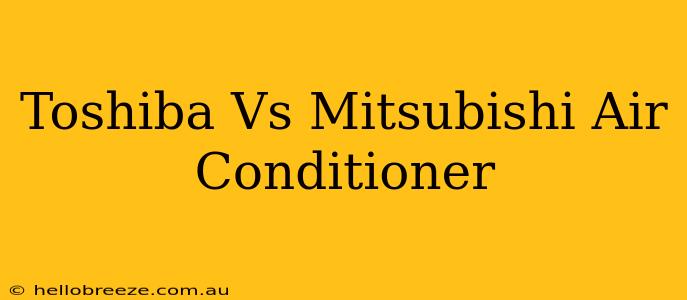Choosing the right air conditioner can significantly impact your comfort and energy bills. Two leading brands frequently vying for top spot are Toshiba and Mitsubishi. Both are known for reliability and efficiency, but which one emerges as the victor? This in-depth comparison will delve into the key features, performance, and pricing of Toshiba and Mitsubishi air conditioners to help you make an informed decision.
Key Features: A Head-to-Head Comparison
Both Toshiba and Mitsubishi offer a wide range of air conditioners, catering to various needs and budgets. However, certain key features distinguish them:
Toshiba:
- Inverter Technology: Most Toshiba models utilize inverter technology, offering precise temperature control and energy savings.
- Quiet Operation: Toshiba air conditioners are generally praised for their quiet operation, making them ideal for bedrooms and quiet living spaces.
- Wide Range of Models: Toshiba offers a diverse selection, including window units, split systems, and ductless mini-splits, catering to various installation preferences.
- Eco-Friendly Refrigerants: Many Toshiba models employ eco-friendly refrigerants, minimizing their environmental impact.
Mitsubishi:
- Hyper-Heating Capacity: Mitsubishi Electric is particularly renowned for its hyper-heating capabilities, making it a strong contender in colder climates.
- Advanced Filtration: Several Mitsubishi models boast advanced filtration systems, capturing dust, allergens, and other airborne particles, improving indoor air quality.
- Smart Home Integration: Mitsubishi frequently integrates smart home technology, allowing for convenient control via smartphone apps.
- Sleek Designs: Mitsubishi often prioritizes aesthetically pleasing designs, complementing modern home aesthetics.
Performance and Efficiency: The Cool Down
Both brands prioritize energy efficiency, but their performance can vary depending on the specific model. Look for the SEER (Seasonal Energy Efficiency Ratio) rating, a higher SEER rating indicates better energy efficiency. Compare SEER ratings of individual models within your budget before making a final decision.
Energy Efficiency: While both offer high-efficiency models, independent testing and reviews will help you determine which specific models offer the best balance of performance and energy efficiency for your needs and climate.
Cooling Power: The cooling capacity (measured in BTUs) should match the size of the room or area you intend to cool. Carefully consider the square footage and insulation of your space when selecting a unit.
Pricing and Warranty: Investing in Comfort
Pricing for both Toshiba and Mitsubishi air conditioners can vary significantly based on the model, features, and size. Generally, both brands fall within a similar price range for comparable models. However, always check current pricing from authorized dealers before making a purchase.
Warranty information is crucial. Check the warranty details for both the compressor and parts for each brand. A longer warranty often reflects greater confidence in the product's reliability.
Which Brand is Right for You?
Ultimately, the "best" brand depends on your specific needs and preferences.
Choose Toshiba if:
- Quiet operation is paramount.
- You need a wide variety of model options.
- Budget is a primary concern (some models offer more budget-friendly options).
Choose Mitsubishi if:
- You live in a cold climate and require superior heating performance.
- Advanced air purification is a priority.
- Smart home integration is desired.
- A sleek, modern design is important.
Conclusion: Making the Right Choice
This comparison provides a general overview. Thorough research, including reading customer reviews and comparing specific model specifications, is essential for making the best decision. Don't hesitate to consult with HVAC professionals to determine the ideal air conditioning solution for your home. Remember to consider factors like your budget, climate, desired features, and energy efficiency targets. Investing in the right air conditioner is an investment in your comfort and long-term savings.

